Report: Creative and Ethical Leadership in the Retail Industry
VerifiedAdded on 2022/12/27
|11
|3620
|58
Report
AI Summary
This report provides an in-depth analysis of creative and ethical leadership within the retail industry. It begins with a personal statement and self-reflection on the author's career experience, highlighting the development of key skills relevant to an HR Manager role. A personal development plan is then presented, outlining strengths, weaknesses, and strategies for skill enhancement, including presentation, negotiation, and communication skills. The report also includes research on suitable leadership approaches in the retail industry, addressing ethical issues such as pollution and untrustworthiness, and emphasizing the importance of creativity. Finally, the report compares various leadership theories, offering a comprehensive overview of leadership principles and their practical application within the retail sector.
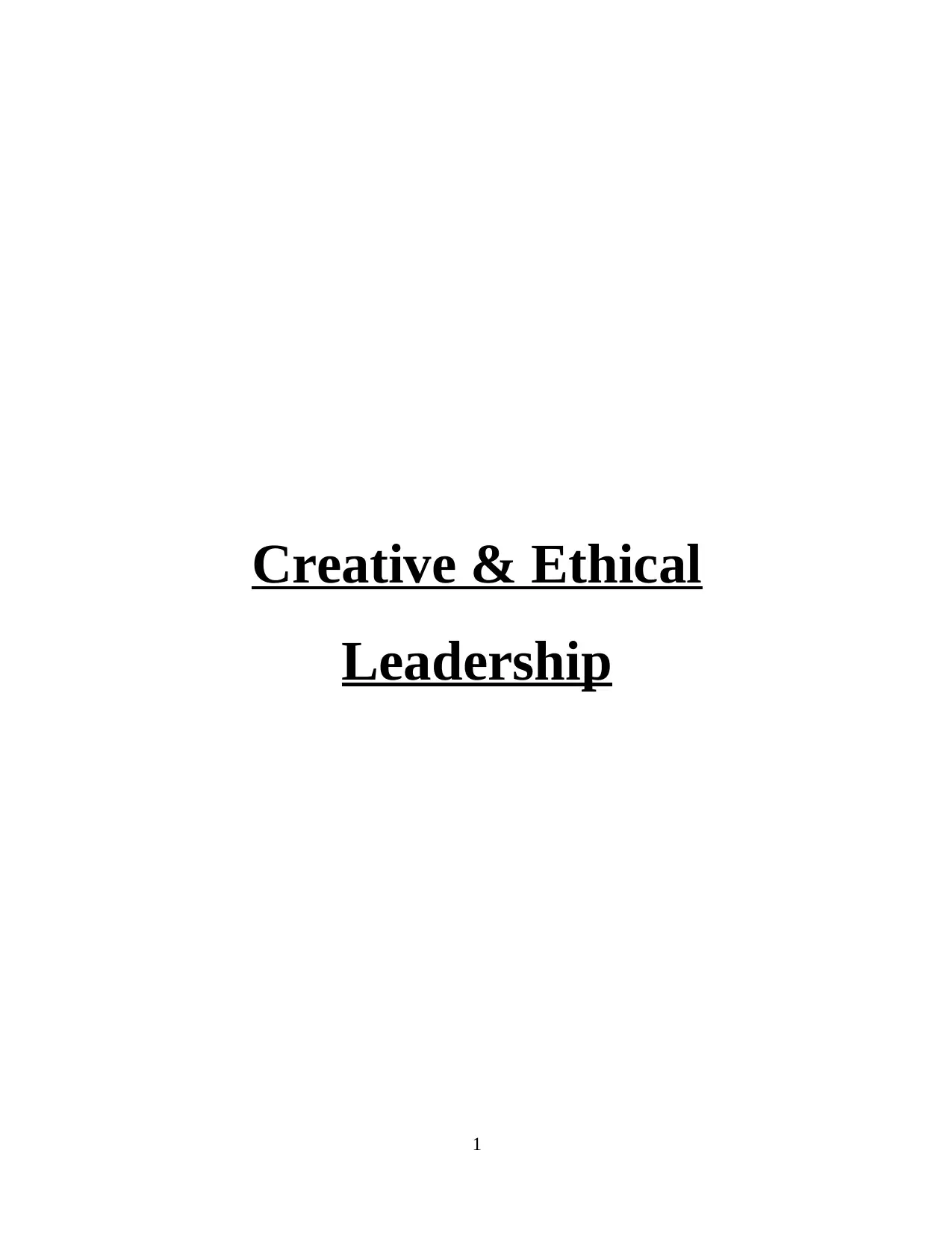
Creative & Ethical
Leadership
1
Leadership
1
Paraphrase This Document
Need a fresh take? Get an instant paraphrase of this document with our AI Paraphraser
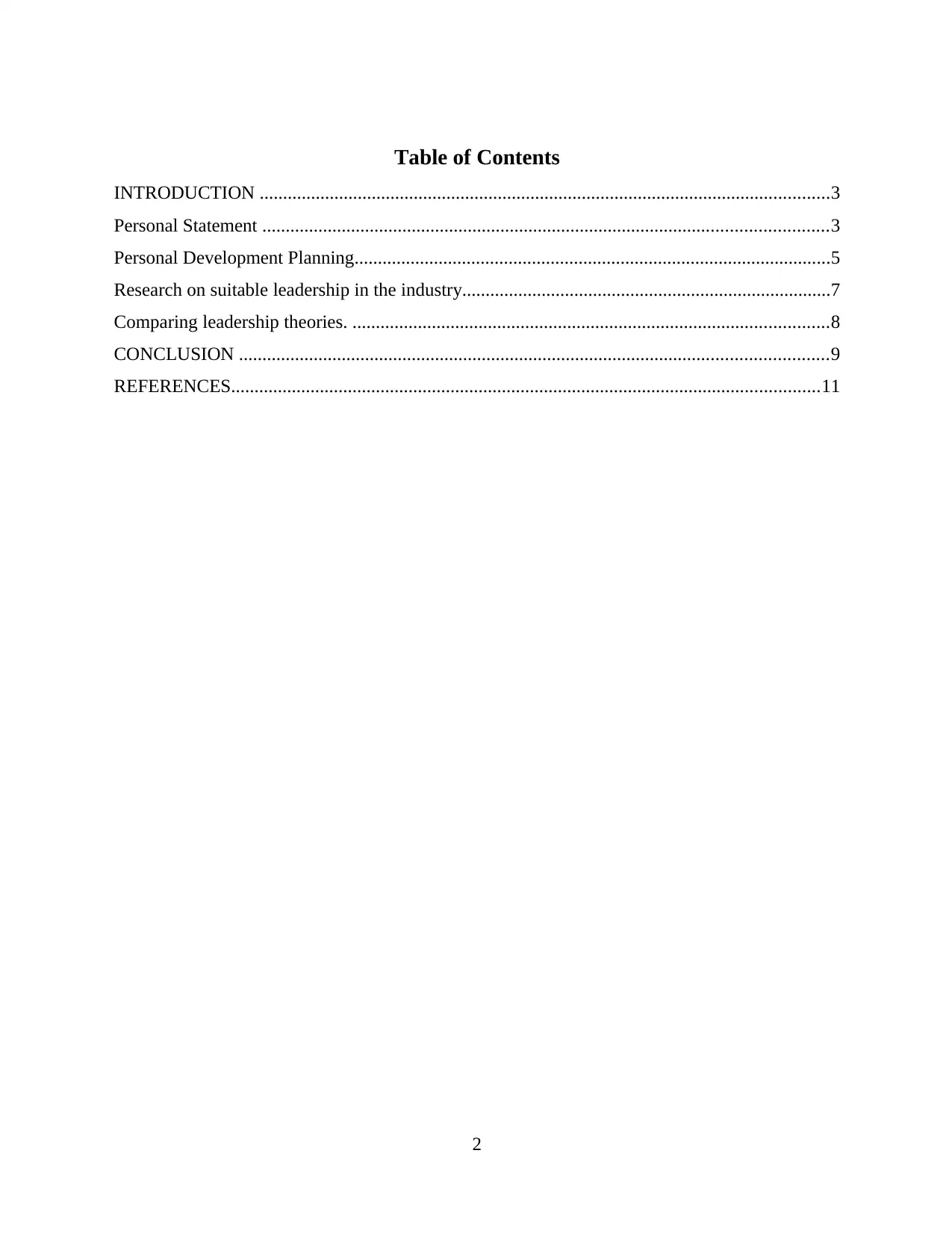
Table of Contents
INTRODUCTION ..........................................................................................................................3
Personal Statement .........................................................................................................................3
Personal Development Planning......................................................................................................5
Research on suitable leadership in the industry...............................................................................7
Comparing leadership theories. ......................................................................................................8
CONCLUSION ..............................................................................................................................9
REFERENCES..............................................................................................................................11
2
INTRODUCTION ..........................................................................................................................3
Personal Statement .........................................................................................................................3
Personal Development Planning......................................................................................................5
Research on suitable leadership in the industry...............................................................................7
Comparing leadership theories. ......................................................................................................8
CONCLUSION ..............................................................................................................................9
REFERENCES..............................................................................................................................11
2
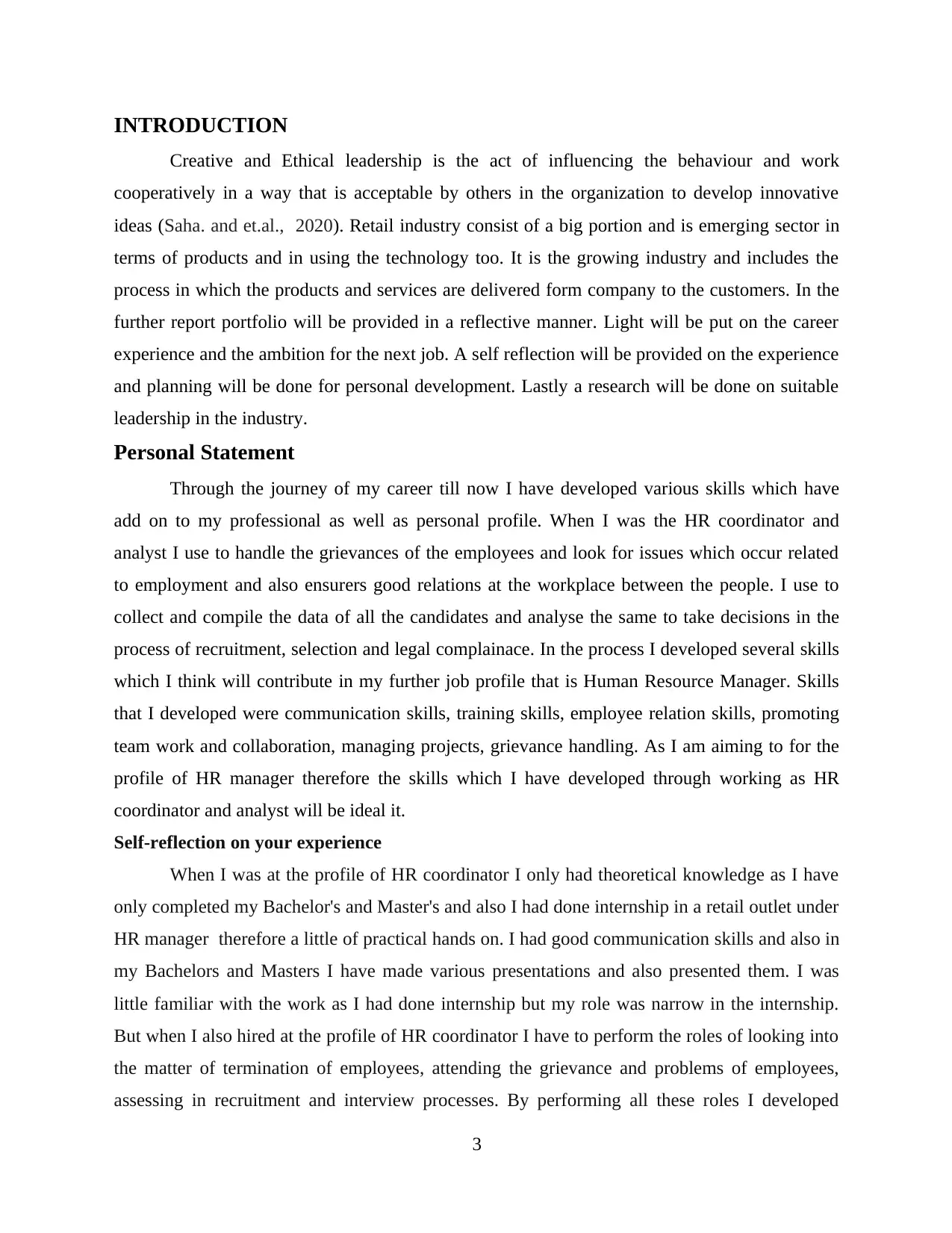
INTRODUCTION
Creative and Ethical leadership is the act of influencing the behaviour and work
cooperatively in a way that is acceptable by others in the organization to develop innovative
ideas (Saha. and et.al., 2020). Retail industry consist of a big portion and is emerging sector in
terms of products and in using the technology too. It is the growing industry and includes the
process in which the products and services are delivered form company to the customers. In the
further report portfolio will be provided in a reflective manner. Light will be put on the career
experience and the ambition for the next job. A self reflection will be provided on the experience
and planning will be done for personal development. Lastly a research will be done on suitable
leadership in the industry.
Personal Statement
Through the journey of my career till now I have developed various skills which have
add on to my professional as well as personal profile. When I was the HR coordinator and
analyst I use to handle the grievances of the employees and look for issues which occur related
to employment and also ensurers good relations at the workplace between the people. I use to
collect and compile the data of all the candidates and analyse the same to take decisions in the
process of recruitment, selection and legal complainace. In the process I developed several skills
which I think will contribute in my further job profile that is Human Resource Manager. Skills
that I developed were communication skills, training skills, employee relation skills, promoting
team work and collaboration, managing projects, grievance handling. As I am aiming to for the
profile of HR manager therefore the skills which I have developed through working as HR
coordinator and analyst will be ideal it.
Self-reflection on your experience
When I was at the profile of HR coordinator I only had theoretical knowledge as I have
only completed my Bachelor's and Master's and also I had done internship in a retail outlet under
HR manager therefore a little of practical hands on. I had good communication skills and also in
my Bachelors and Masters I have made various presentations and also presented them. I was
little familiar with the work as I had done internship but my role was narrow in the internship.
But when I also hired at the profile of HR coordinator I have to perform the roles of looking into
the matter of termination of employees, attending the grievance and problems of employees,
assessing in recruitment and interview processes. By performing all these roles I developed
3
Creative and Ethical leadership is the act of influencing the behaviour and work
cooperatively in a way that is acceptable by others in the organization to develop innovative
ideas (Saha. and et.al., 2020). Retail industry consist of a big portion and is emerging sector in
terms of products and in using the technology too. It is the growing industry and includes the
process in which the products and services are delivered form company to the customers. In the
further report portfolio will be provided in a reflective manner. Light will be put on the career
experience and the ambition for the next job. A self reflection will be provided on the experience
and planning will be done for personal development. Lastly a research will be done on suitable
leadership in the industry.
Personal Statement
Through the journey of my career till now I have developed various skills which have
add on to my professional as well as personal profile. When I was the HR coordinator and
analyst I use to handle the grievances of the employees and look for issues which occur related
to employment and also ensurers good relations at the workplace between the people. I use to
collect and compile the data of all the candidates and analyse the same to take decisions in the
process of recruitment, selection and legal complainace. In the process I developed several skills
which I think will contribute in my further job profile that is Human Resource Manager. Skills
that I developed were communication skills, training skills, employee relation skills, promoting
team work and collaboration, managing projects, grievance handling. As I am aiming to for the
profile of HR manager therefore the skills which I have developed through working as HR
coordinator and analyst will be ideal it.
Self-reflection on your experience
When I was at the profile of HR coordinator I only had theoretical knowledge as I have
only completed my Bachelor's and Master's and also I had done internship in a retail outlet under
HR manager therefore a little of practical hands on. I had good communication skills and also in
my Bachelors and Masters I have made various presentations and also presented them. I was
little familiar with the work as I had done internship but my role was narrow in the internship.
But when I also hired at the profile of HR coordinator I have to perform the roles of looking into
the matter of termination of employees, attending the grievance and problems of employees,
assessing in recruitment and interview processes. By performing all these roles I developed
3
⊘ This is a preview!⊘
Do you want full access?
Subscribe today to unlock all pages.

Trusted by 1+ million students worldwide
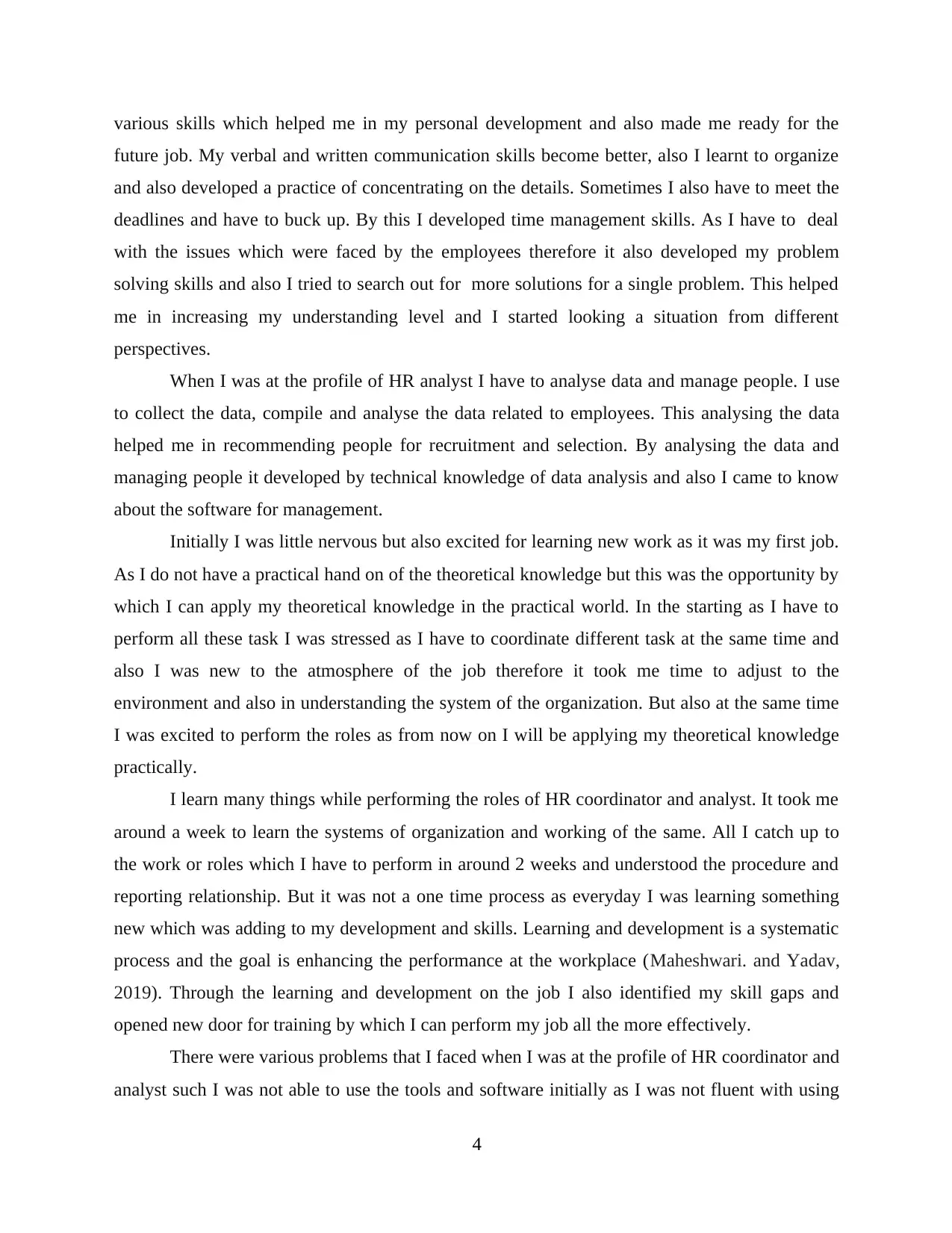
various skills which helped me in my personal development and also made me ready for the
future job. My verbal and written communication skills become better, also I learnt to organize
and also developed a practice of concentrating on the details. Sometimes I also have to meet the
deadlines and have to buck up. By this I developed time management skills. As I have to deal
with the issues which were faced by the employees therefore it also developed my problem
solving skills and also I tried to search out for more solutions for a single problem. This helped
me in increasing my understanding level and I started looking a situation from different
perspectives.
When I was at the profile of HR analyst I have to analyse data and manage people. I use
to collect the data, compile and analyse the data related to employees. This analysing the data
helped me in recommending people for recruitment and selection. By analysing the data and
managing people it developed by technical knowledge of data analysis and also I came to know
about the software for management.
Initially I was little nervous but also excited for learning new work as it was my first job.
As I do not have a practical hand on of the theoretical knowledge but this was the opportunity by
which I can apply my theoretical knowledge in the practical world. In the starting as I have to
perform all these task I was stressed as I have to coordinate different task at the same time and
also I was new to the atmosphere of the job therefore it took me time to adjust to the
environment and also in understanding the system of the organization. But also at the same time
I was excited to perform the roles as from now on I will be applying my theoretical knowledge
practically.
I learn many things while performing the roles of HR coordinator and analyst. It took me
around a week to learn the systems of organization and working of the same. All I catch up to
the work or roles which I have to perform in around 2 weeks and understood the procedure and
reporting relationship. But it was not a one time process as everyday I was learning something
new which was adding to my development and skills. Learning and development is a systematic
process and the goal is enhancing the performance at the workplace (Maheshwari. and Yadav,
2019). Through the learning and development on the job I also identified my skill gaps and
opened new door for training by which I can perform my job all the more effectively.
There were various problems that I faced when I was at the profile of HR coordinator and
analyst such I was not able to use the tools and software initially as I was not fluent with using
4
future job. My verbal and written communication skills become better, also I learnt to organize
and also developed a practice of concentrating on the details. Sometimes I also have to meet the
deadlines and have to buck up. By this I developed time management skills. As I have to deal
with the issues which were faced by the employees therefore it also developed my problem
solving skills and also I tried to search out for more solutions for a single problem. This helped
me in increasing my understanding level and I started looking a situation from different
perspectives.
When I was at the profile of HR analyst I have to analyse data and manage people. I use
to collect the data, compile and analyse the data related to employees. This analysing the data
helped me in recommending people for recruitment and selection. By analysing the data and
managing people it developed by technical knowledge of data analysis and also I came to know
about the software for management.
Initially I was little nervous but also excited for learning new work as it was my first job.
As I do not have a practical hand on of the theoretical knowledge but this was the opportunity by
which I can apply my theoretical knowledge in the practical world. In the starting as I have to
perform all these task I was stressed as I have to coordinate different task at the same time and
also I was new to the atmosphere of the job therefore it took me time to adjust to the
environment and also in understanding the system of the organization. But also at the same time
I was excited to perform the roles as from now on I will be applying my theoretical knowledge
practically.
I learn many things while performing the roles of HR coordinator and analyst. It took me
around a week to learn the systems of organization and working of the same. All I catch up to
the work or roles which I have to perform in around 2 weeks and understood the procedure and
reporting relationship. But it was not a one time process as everyday I was learning something
new which was adding to my development and skills. Learning and development is a systematic
process and the goal is enhancing the performance at the workplace (Maheshwari. and Yadav,
2019). Through the learning and development on the job I also identified my skill gaps and
opened new door for training by which I can perform my job all the more effectively.
There were various problems that I faced when I was at the profile of HR coordinator and
analyst such I was not able to use the tools and software initially as I was not fluent with using
4
Paraphrase This Document
Need a fresh take? Get an instant paraphrase of this document with our AI Paraphraser
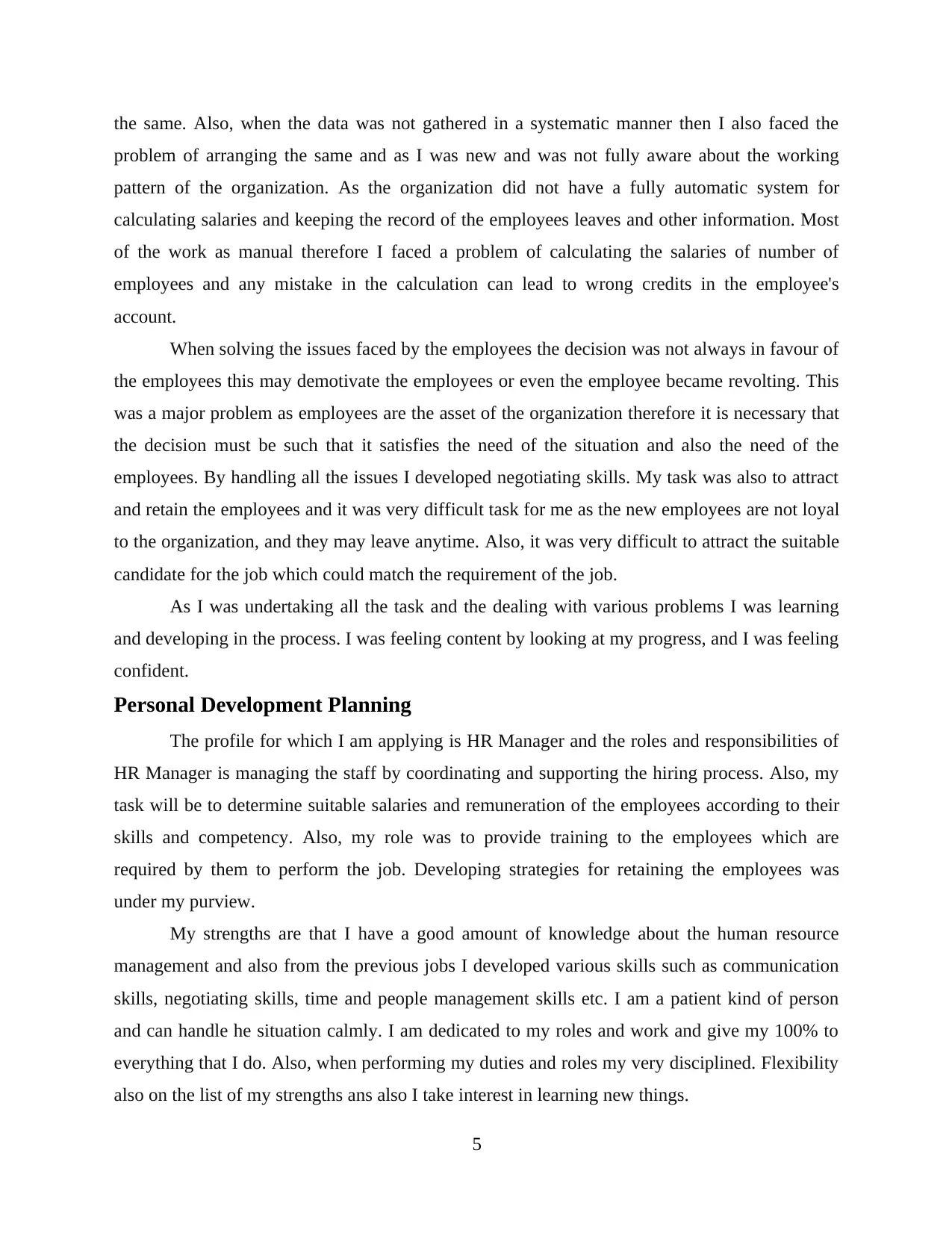
the same. Also, when the data was not gathered in a systematic manner then I also faced the
problem of arranging the same and as I was new and was not fully aware about the working
pattern of the organization. As the organization did not have a fully automatic system for
calculating salaries and keeping the record of the employees leaves and other information. Most
of the work as manual therefore I faced a problem of calculating the salaries of number of
employees and any mistake in the calculation can lead to wrong credits in the employee's
account.
When solving the issues faced by the employees the decision was not always in favour of
the employees this may demotivate the employees or even the employee became revolting. This
was a major problem as employees are the asset of the organization therefore it is necessary that
the decision must be such that it satisfies the need of the situation and also the need of the
employees. By handling all the issues I developed negotiating skills. My task was also to attract
and retain the employees and it was very difficult task for me as the new employees are not loyal
to the organization, and they may leave anytime. Also, it was very difficult to attract the suitable
candidate for the job which could match the requirement of the job.
As I was undertaking all the task and the dealing with various problems I was learning
and developing in the process. I was feeling content by looking at my progress, and I was feeling
confident.
Personal Development Planning
The profile for which I am applying is HR Manager and the roles and responsibilities of
HR Manager is managing the staff by coordinating and supporting the hiring process. Also, my
task will be to determine suitable salaries and remuneration of the employees according to their
skills and competency. Also, my role was to provide training to the employees which are
required by them to perform the job. Developing strategies for retaining the employees was
under my purview.
My strengths are that I have a good amount of knowledge about the human resource
management and also from the previous jobs I developed various skills such as communication
skills, negotiating skills, time and people management skills etc. I am a patient kind of person
and can handle he situation calmly. I am dedicated to my roles and work and give my 100% to
everything that I do. Also, when performing my duties and roles my very disciplined. Flexibility
also on the list of my strengths ans also I take interest in learning new things.
5
problem of arranging the same and as I was new and was not fully aware about the working
pattern of the organization. As the organization did not have a fully automatic system for
calculating salaries and keeping the record of the employees leaves and other information. Most
of the work as manual therefore I faced a problem of calculating the salaries of number of
employees and any mistake in the calculation can lead to wrong credits in the employee's
account.
When solving the issues faced by the employees the decision was not always in favour of
the employees this may demotivate the employees or even the employee became revolting. This
was a major problem as employees are the asset of the organization therefore it is necessary that
the decision must be such that it satisfies the need of the situation and also the need of the
employees. By handling all the issues I developed negotiating skills. My task was also to attract
and retain the employees and it was very difficult task for me as the new employees are not loyal
to the organization, and they may leave anytime. Also, it was very difficult to attract the suitable
candidate for the job which could match the requirement of the job.
As I was undertaking all the task and the dealing with various problems I was learning
and developing in the process. I was feeling content by looking at my progress, and I was feeling
confident.
Personal Development Planning
The profile for which I am applying is HR Manager and the roles and responsibilities of
HR Manager is managing the staff by coordinating and supporting the hiring process. Also, my
task will be to determine suitable salaries and remuneration of the employees according to their
skills and competency. Also, my role was to provide training to the employees which are
required by them to perform the job. Developing strategies for retaining the employees was
under my purview.
My strengths are that I have a good amount of knowledge about the human resource
management and also from the previous jobs I developed various skills such as communication
skills, negotiating skills, time and people management skills etc. I am a patient kind of person
and can handle he situation calmly. I am dedicated to my roles and work and give my 100% to
everything that I do. Also, when performing my duties and roles my very disciplined. Flexibility
also on the list of my strengths ans also I take interest in learning new things.
5
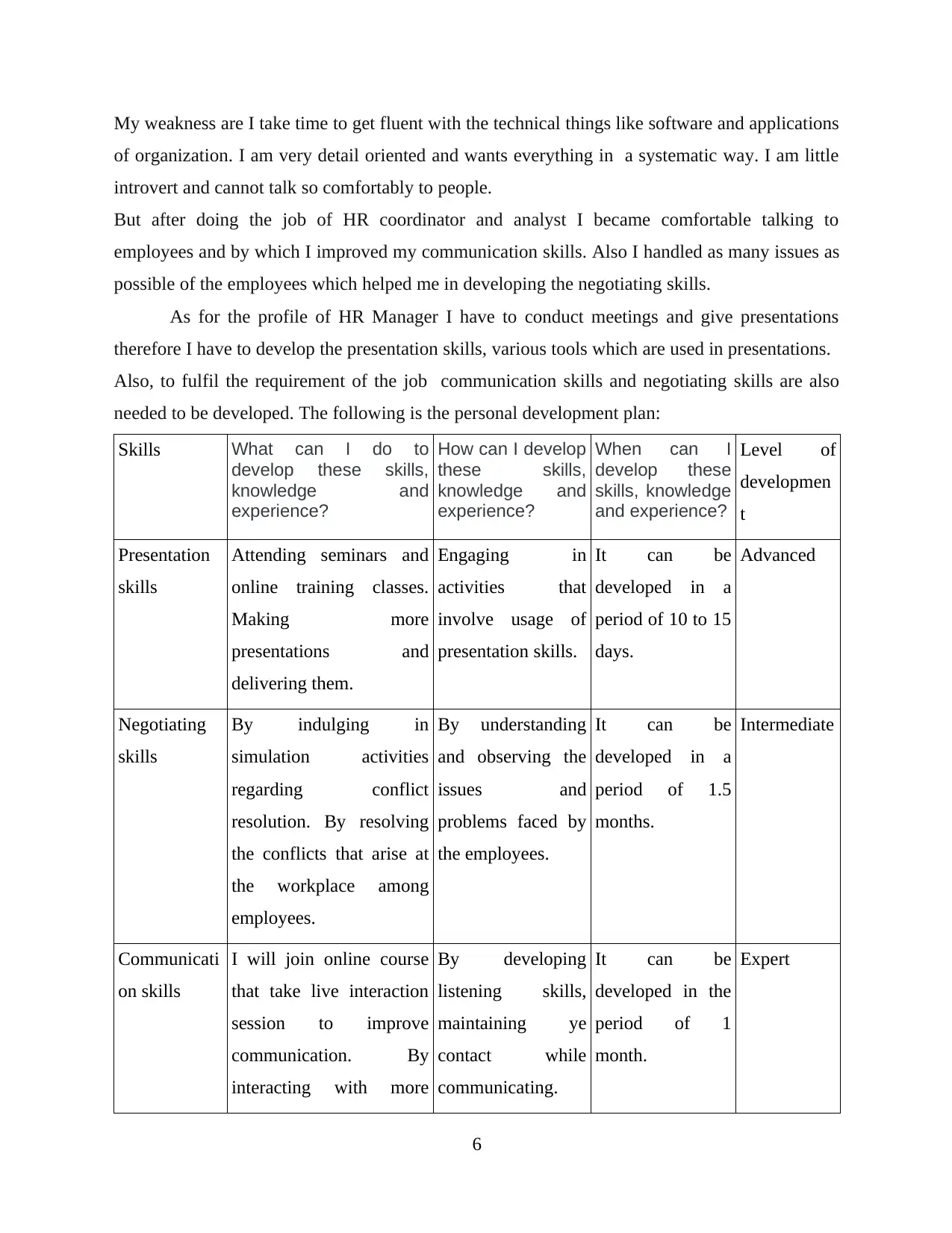
My weakness are I take time to get fluent with the technical things like software and applications
of organization. I am very detail oriented and wants everything in a systematic way. I am little
introvert and cannot talk so comfortably to people.
But after doing the job of HR coordinator and analyst I became comfortable talking to
employees and by which I improved my communication skills. Also I handled as many issues as
possible of the employees which helped me in developing the negotiating skills.
As for the profile of HR Manager I have to conduct meetings and give presentations
therefore I have to develop the presentation skills, various tools which are used in presentations.
Also, to fulfil the requirement of the job communication skills and negotiating skills are also
needed to be developed. The following is the personal development plan:
Skills What can I do to
develop these skills,
knowledge and
experience?
How can I develop
these skills,
knowledge and
experience?
When can I
develop these
skills, knowledge
and experience?
Level of
developmen
t
Presentation
skills
Attending seminars and
online training classes.
Making more
presentations and
delivering them.
Engaging in
activities that
involve usage of
presentation skills.
It can be
developed in a
period of 10 to 15
days.
Advanced
Negotiating
skills
By indulging in
simulation activities
regarding conflict
resolution. By resolving
the conflicts that arise at
the workplace among
employees.
By understanding
and observing the
issues and
problems faced by
the employees.
It can be
developed in a
period of 1.5
months.
Intermediate
Communicati
on skills
I will join online course
that take live interaction
session to improve
communication. By
interacting with more
By developing
listening skills,
maintaining ye
contact while
communicating.
It can be
developed in the
period of 1
month.
Expert
6
of organization. I am very detail oriented and wants everything in a systematic way. I am little
introvert and cannot talk so comfortably to people.
But after doing the job of HR coordinator and analyst I became comfortable talking to
employees and by which I improved my communication skills. Also I handled as many issues as
possible of the employees which helped me in developing the negotiating skills.
As for the profile of HR Manager I have to conduct meetings and give presentations
therefore I have to develop the presentation skills, various tools which are used in presentations.
Also, to fulfil the requirement of the job communication skills and negotiating skills are also
needed to be developed. The following is the personal development plan:
Skills What can I do to
develop these skills,
knowledge and
experience?
How can I develop
these skills,
knowledge and
experience?
When can I
develop these
skills, knowledge
and experience?
Level of
developmen
t
Presentation
skills
Attending seminars and
online training classes.
Making more
presentations and
delivering them.
Engaging in
activities that
involve usage of
presentation skills.
It can be
developed in a
period of 10 to 15
days.
Advanced
Negotiating
skills
By indulging in
simulation activities
regarding conflict
resolution. By resolving
the conflicts that arise at
the workplace among
employees.
By understanding
and observing the
issues and
problems faced by
the employees.
It can be
developed in a
period of 1.5
months.
Intermediate
Communicati
on skills
I will join online course
that take live interaction
session to improve
communication. By
interacting with more
By developing
listening skills,
maintaining ye
contact while
communicating.
It can be
developed in the
period of 1
month.
Expert
6
⊘ This is a preview!⊘
Do you want full access?
Subscribe today to unlock all pages.

Trusted by 1+ million students worldwide
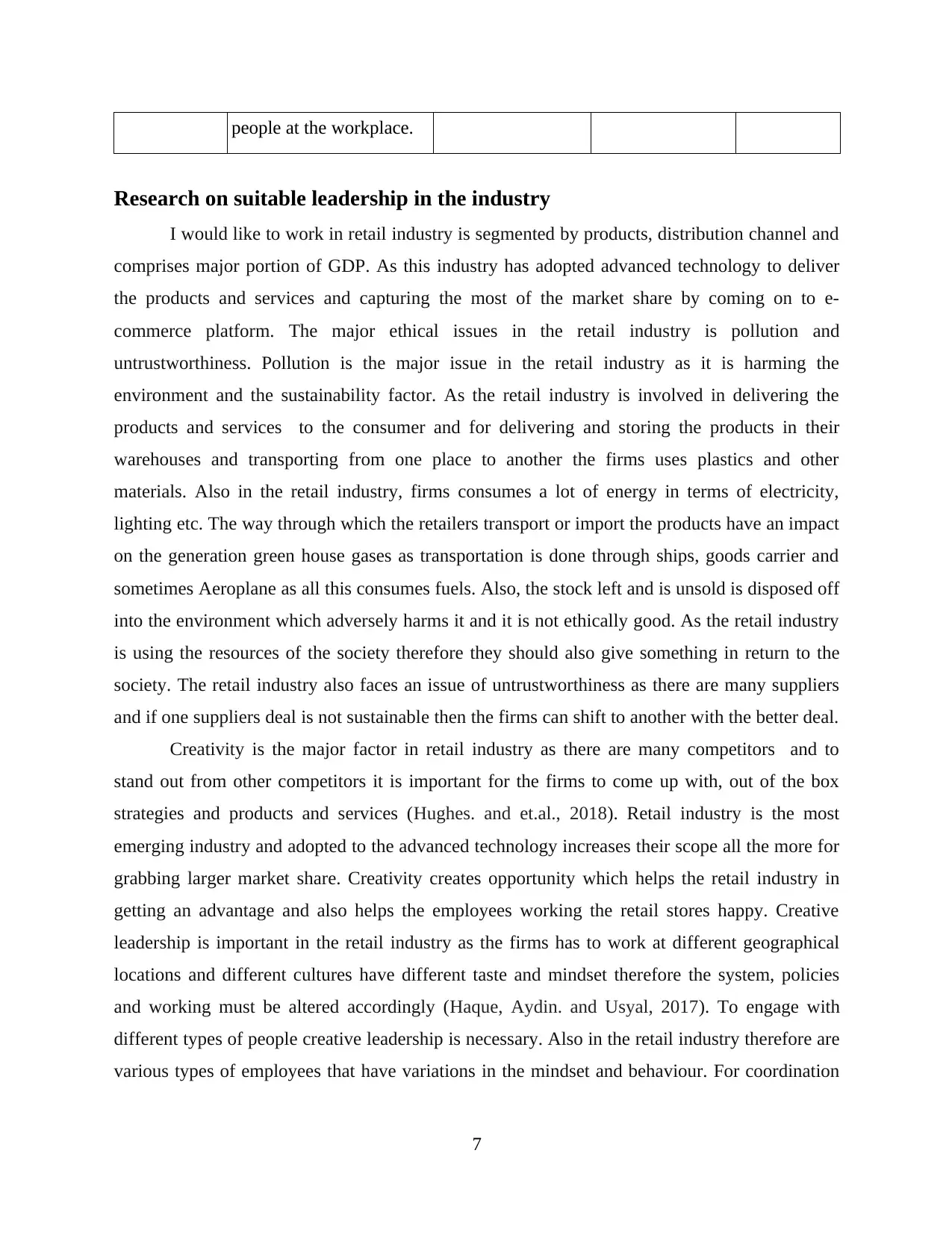
people at the workplace.
Research on suitable leadership in the industry
I would like to work in retail industry is segmented by products, distribution channel and
comprises major portion of GDP. As this industry has adopted advanced technology to deliver
the products and services and capturing the most of the market share by coming on to e-
commerce platform. The major ethical issues in the retail industry is pollution and
untrustworthiness. Pollution is the major issue in the retail industry as it is harming the
environment and the sustainability factor. As the retail industry is involved in delivering the
products and services to the consumer and for delivering and storing the products in their
warehouses and transporting from one place to another the firms uses plastics and other
materials. Also in the retail industry, firms consumes a lot of energy in terms of electricity,
lighting etc. The way through which the retailers transport or import the products have an impact
on the generation green house gases as transportation is done through ships, goods carrier and
sometimes Aeroplane as all this consumes fuels. Also, the stock left and is unsold is disposed off
into the environment which adversely harms it and it is not ethically good. As the retail industry
is using the resources of the society therefore they should also give something in return to the
society. The retail industry also faces an issue of untrustworthiness as there are many suppliers
and if one suppliers deal is not sustainable then the firms can shift to another with the better deal.
Creativity is the major factor in retail industry as there are many competitors and to
stand out from other competitors it is important for the firms to come up with, out of the box
strategies and products and services (Hughes. and et.al., 2018). Retail industry is the most
emerging industry and adopted to the advanced technology increases their scope all the more for
grabbing larger market share. Creativity creates opportunity which helps the retail industry in
getting an advantage and also helps the employees working the retail stores happy. Creative
leadership is important in the retail industry as the firms has to work at different geographical
locations and different cultures have different taste and mindset therefore the system, policies
and working must be altered accordingly (Haque, Aydin. and Usyal, 2017). To engage with
different types of people creative leadership is necessary. Also in the retail industry therefore are
various types of employees that have variations in the mindset and behaviour. For coordination
7
Research on suitable leadership in the industry
I would like to work in retail industry is segmented by products, distribution channel and
comprises major portion of GDP. As this industry has adopted advanced technology to deliver
the products and services and capturing the most of the market share by coming on to e-
commerce platform. The major ethical issues in the retail industry is pollution and
untrustworthiness. Pollution is the major issue in the retail industry as it is harming the
environment and the sustainability factor. As the retail industry is involved in delivering the
products and services to the consumer and for delivering and storing the products in their
warehouses and transporting from one place to another the firms uses plastics and other
materials. Also in the retail industry, firms consumes a lot of energy in terms of electricity,
lighting etc. The way through which the retailers transport or import the products have an impact
on the generation green house gases as transportation is done through ships, goods carrier and
sometimes Aeroplane as all this consumes fuels. Also, the stock left and is unsold is disposed off
into the environment which adversely harms it and it is not ethically good. As the retail industry
is using the resources of the society therefore they should also give something in return to the
society. The retail industry also faces an issue of untrustworthiness as there are many suppliers
and if one suppliers deal is not sustainable then the firms can shift to another with the better deal.
Creativity is the major factor in retail industry as there are many competitors and to
stand out from other competitors it is important for the firms to come up with, out of the box
strategies and products and services (Hughes. and et.al., 2018). Retail industry is the most
emerging industry and adopted to the advanced technology increases their scope all the more for
grabbing larger market share. Creativity creates opportunity which helps the retail industry in
getting an advantage and also helps the employees working the retail stores happy. Creative
leadership is important in the retail industry as the firms has to work at different geographical
locations and different cultures have different taste and mindset therefore the system, policies
and working must be altered accordingly (Haque, Aydin. and Usyal, 2017). To engage with
different types of people creative leadership is necessary. Also in the retail industry therefore are
various types of employees that have variations in the mindset and behaviour. For coordination
7
Paraphrase This Document
Need a fresh take? Get an instant paraphrase of this document with our AI Paraphraser
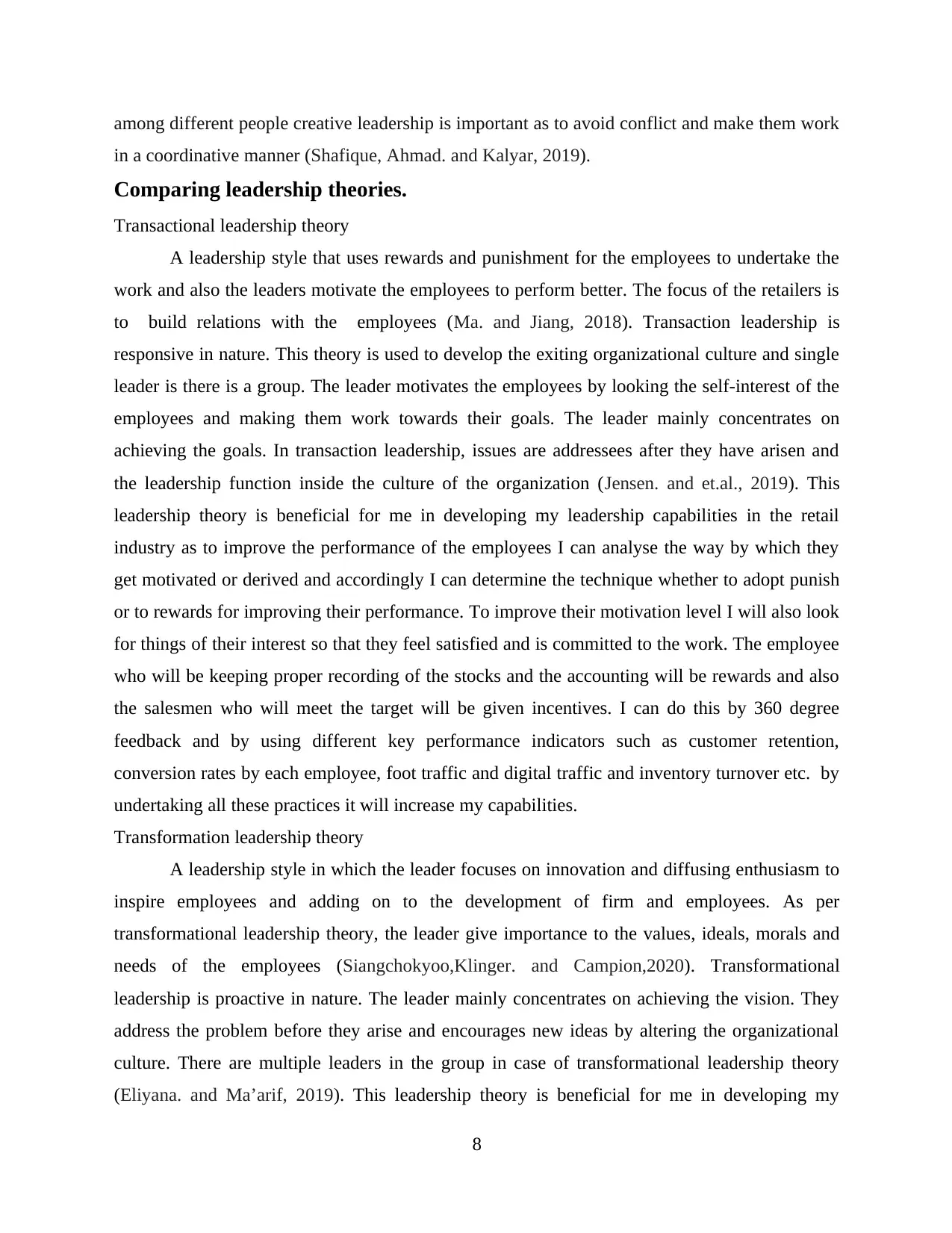
among different people creative leadership is important as to avoid conflict and make them work
in a coordinative manner (Shafique, Ahmad. and Kalyar, 2019).
Comparing leadership theories.
Transactional leadership theory
A leadership style that uses rewards and punishment for the employees to undertake the
work and also the leaders motivate the employees to perform better. The focus of the retailers is
to build relations with the employees (Ma. and Jiang, 2018). Transaction leadership is
responsive in nature. This theory is used to develop the exiting organizational culture and single
leader is there is a group. The leader motivates the employees by looking the self-interest of the
employees and making them work towards their goals. The leader mainly concentrates on
achieving the goals. In transaction leadership, issues are addressees after they have arisen and
the leadership function inside the culture of the organization (Jensen. and et.al., 2019). This
leadership theory is beneficial for me in developing my leadership capabilities in the retail
industry as to improve the performance of the employees I can analyse the way by which they
get motivated or derived and accordingly I can determine the technique whether to adopt punish
or to rewards for improving their performance. To improve their motivation level I will also look
for things of their interest so that they feel satisfied and is committed to the work. The employee
who will be keeping proper recording of the stocks and the accounting will be rewards and also
the salesmen who will meet the target will be given incentives. I can do this by 360 degree
feedback and by using different key performance indicators such as customer retention,
conversion rates by each employee, foot traffic and digital traffic and inventory turnover etc. by
undertaking all these practices it will increase my capabilities.
Transformation leadership theory
A leadership style in which the leader focuses on innovation and diffusing enthusiasm to
inspire employees and adding on to the development of firm and employees. As per
transformational leadership theory, the leader give importance to the values, ideals, morals and
needs of the employees (Siangchokyoo,Klinger. and Campion,2020). Transformational
leadership is proactive in nature. The leader mainly concentrates on achieving the vision. They
address the problem before they arise and encourages new ideas by altering the organizational
culture. There are multiple leaders in the group in case of transformational leadership theory
(Eliyana. and Ma’arif, 2019). This leadership theory is beneficial for me in developing my
8
in a coordinative manner (Shafique, Ahmad. and Kalyar, 2019).
Comparing leadership theories.
Transactional leadership theory
A leadership style that uses rewards and punishment for the employees to undertake the
work and also the leaders motivate the employees to perform better. The focus of the retailers is
to build relations with the employees (Ma. and Jiang, 2018). Transaction leadership is
responsive in nature. This theory is used to develop the exiting organizational culture and single
leader is there is a group. The leader motivates the employees by looking the self-interest of the
employees and making them work towards their goals. The leader mainly concentrates on
achieving the goals. In transaction leadership, issues are addressees after they have arisen and
the leadership function inside the culture of the organization (Jensen. and et.al., 2019). This
leadership theory is beneficial for me in developing my leadership capabilities in the retail
industry as to improve the performance of the employees I can analyse the way by which they
get motivated or derived and accordingly I can determine the technique whether to adopt punish
or to rewards for improving their performance. To improve their motivation level I will also look
for things of their interest so that they feel satisfied and is committed to the work. The employee
who will be keeping proper recording of the stocks and the accounting will be rewards and also
the salesmen who will meet the target will be given incentives. I can do this by 360 degree
feedback and by using different key performance indicators such as customer retention,
conversion rates by each employee, foot traffic and digital traffic and inventory turnover etc. by
undertaking all these practices it will increase my capabilities.
Transformation leadership theory
A leadership style in which the leader focuses on innovation and diffusing enthusiasm to
inspire employees and adding on to the development of firm and employees. As per
transformational leadership theory, the leader give importance to the values, ideals, morals and
needs of the employees (Siangchokyoo,Klinger. and Campion,2020). Transformational
leadership is proactive in nature. The leader mainly concentrates on achieving the vision. They
address the problem before they arise and encourages new ideas by altering the organizational
culture. There are multiple leaders in the group in case of transformational leadership theory
(Eliyana. and Ma’arif, 2019). This leadership theory is beneficial for me in developing my
8
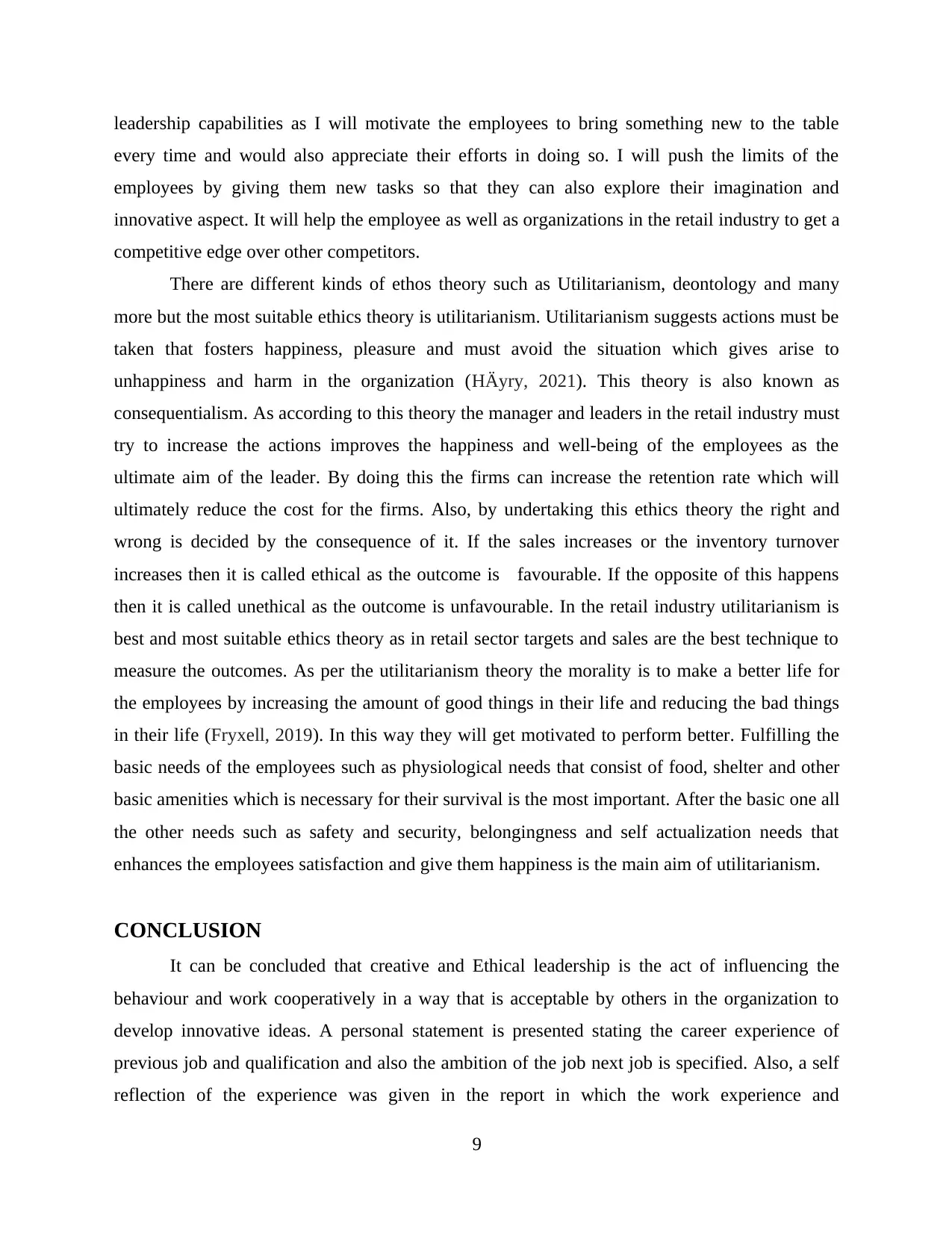
leadership capabilities as I will motivate the employees to bring something new to the table
every time and would also appreciate their efforts in doing so. I will push the limits of the
employees by giving them new tasks so that they can also explore their imagination and
innovative aspect. It will help the employee as well as organizations in the retail industry to get a
competitive edge over other competitors.
There are different kinds of ethos theory such as Utilitarianism, deontology and many
more but the most suitable ethics theory is utilitarianism. Utilitarianism suggests actions must be
taken that fosters happiness, pleasure and must avoid the situation which gives arise to
unhappiness and harm in the organization (HÄyry, 2021). This theory is also known as
consequentialism. As according to this theory the manager and leaders in the retail industry must
try to increase the actions improves the happiness and well-being of the employees as the
ultimate aim of the leader. By doing this the firms can increase the retention rate which will
ultimately reduce the cost for the firms. Also, by undertaking this ethics theory the right and
wrong is decided by the consequence of it. If the sales increases or the inventory turnover
increases then it is called ethical as the outcome is favourable. If the opposite of this happens
then it is called unethical as the outcome is unfavourable. In the retail industry utilitarianism is
best and most suitable ethics theory as in retail sector targets and sales are the best technique to
measure the outcomes. As per the utilitarianism theory the morality is to make a better life for
the employees by increasing the amount of good things in their life and reducing the bad things
in their life (Fryxell, 2019). In this way they will get motivated to perform better. Fulfilling the
basic needs of the employees such as physiological needs that consist of food, shelter and other
basic amenities which is necessary for their survival is the most important. After the basic one all
the other needs such as safety and security, belongingness and self actualization needs that
enhances the employees satisfaction and give them happiness is the main aim of utilitarianism.
CONCLUSION
It can be concluded that creative and Ethical leadership is the act of influencing the
behaviour and work cooperatively in a way that is acceptable by others in the organization to
develop innovative ideas. A personal statement is presented stating the career experience of
previous job and qualification and also the ambition of the job next job is specified. Also, a self
reflection of the experience was given in the report in which the work experience and
9
every time and would also appreciate their efforts in doing so. I will push the limits of the
employees by giving them new tasks so that they can also explore their imagination and
innovative aspect. It will help the employee as well as organizations in the retail industry to get a
competitive edge over other competitors.
There are different kinds of ethos theory such as Utilitarianism, deontology and many
more but the most suitable ethics theory is utilitarianism. Utilitarianism suggests actions must be
taken that fosters happiness, pleasure and must avoid the situation which gives arise to
unhappiness and harm in the organization (HÄyry, 2021). This theory is also known as
consequentialism. As according to this theory the manager and leaders in the retail industry must
try to increase the actions improves the happiness and well-being of the employees as the
ultimate aim of the leader. By doing this the firms can increase the retention rate which will
ultimately reduce the cost for the firms. Also, by undertaking this ethics theory the right and
wrong is decided by the consequence of it. If the sales increases or the inventory turnover
increases then it is called ethical as the outcome is favourable. If the opposite of this happens
then it is called unethical as the outcome is unfavourable. In the retail industry utilitarianism is
best and most suitable ethics theory as in retail sector targets and sales are the best technique to
measure the outcomes. As per the utilitarianism theory the morality is to make a better life for
the employees by increasing the amount of good things in their life and reducing the bad things
in their life (Fryxell, 2019). In this way they will get motivated to perform better. Fulfilling the
basic needs of the employees such as physiological needs that consist of food, shelter and other
basic amenities which is necessary for their survival is the most important. After the basic one all
the other needs such as safety and security, belongingness and self actualization needs that
enhances the employees satisfaction and give them happiness is the main aim of utilitarianism.
CONCLUSION
It can be concluded that creative and Ethical leadership is the act of influencing the
behaviour and work cooperatively in a way that is acceptable by others in the organization to
develop innovative ideas. A personal statement is presented stating the career experience of
previous job and qualification and also the ambition of the job next job is specified. Also, a self
reflection of the experience was given in the report in which the work experience and
9
⊘ This is a preview!⊘
Do you want full access?
Subscribe today to unlock all pages.

Trusted by 1+ million students worldwide
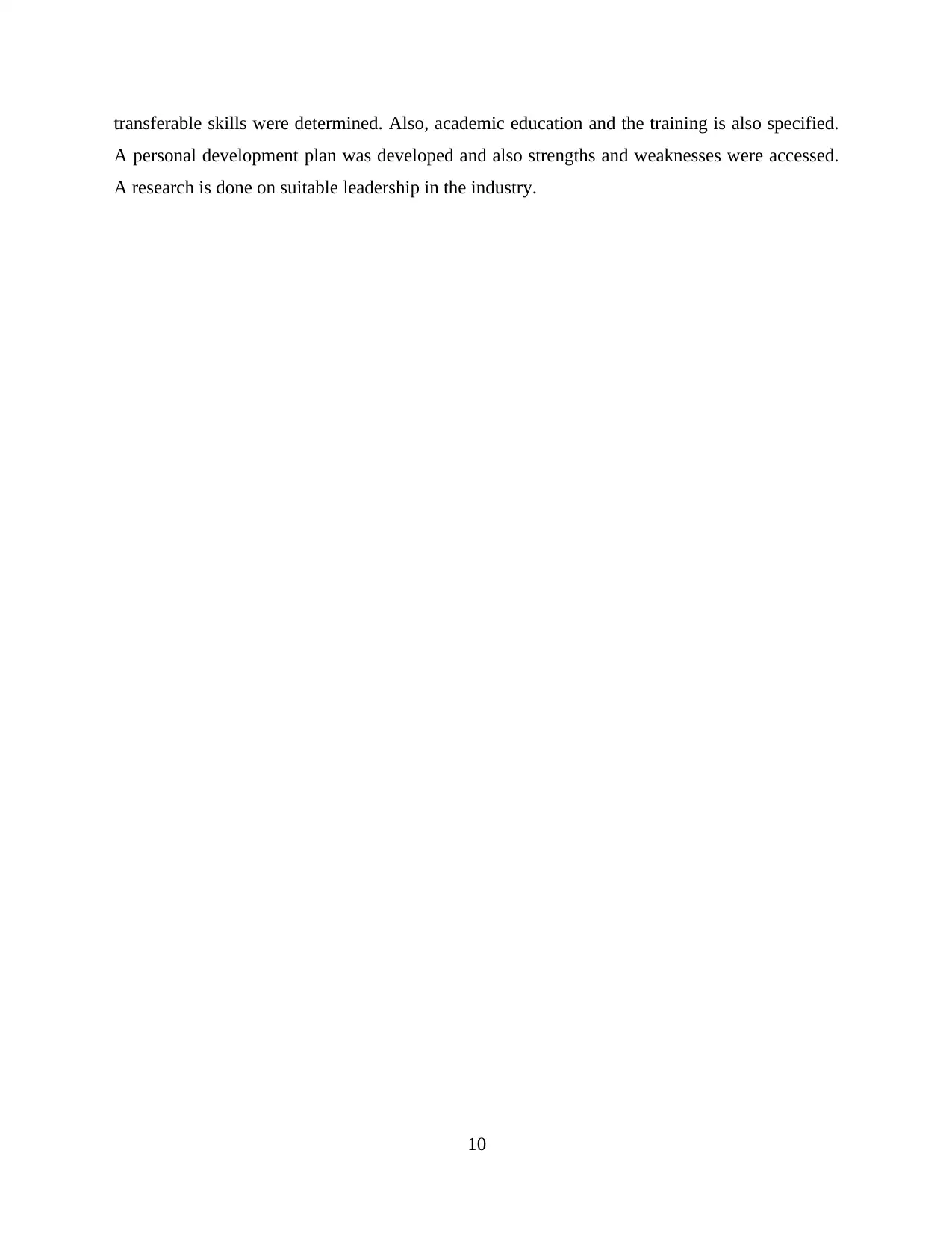
transferable skills were determined. Also, academic education and the training is also specified.
A personal development plan was developed and also strengths and weaknesses were accessed.
A research is done on suitable leadership in the industry.
10
A personal development plan was developed and also strengths and weaknesses were accessed.
A research is done on suitable leadership in the industry.
10
Paraphrase This Document
Need a fresh take? Get an instant paraphrase of this document with our AI Paraphraser
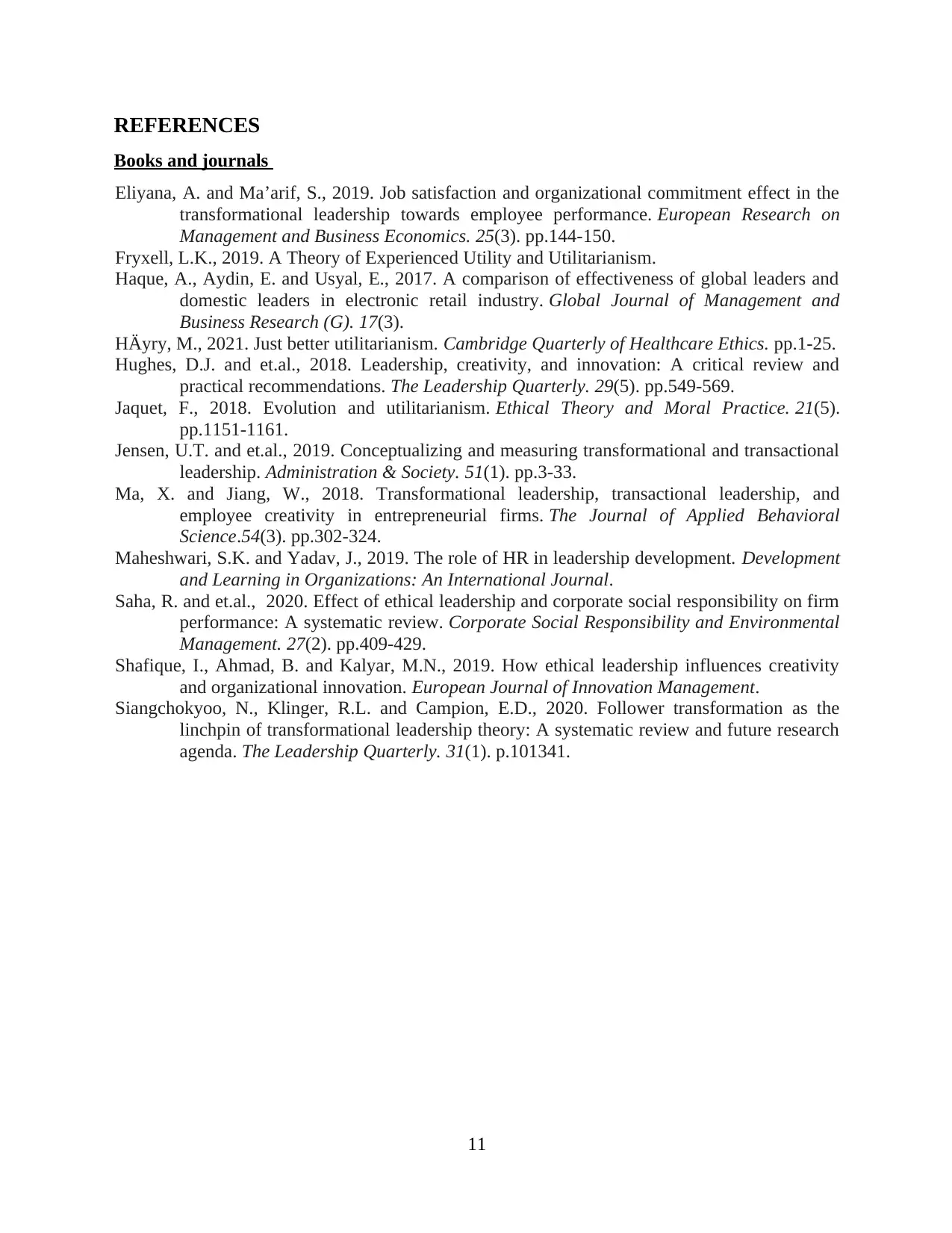
REFERENCES
Books and journals
Eliyana, A. and Ma’arif, S., 2019. Job satisfaction and organizational commitment effect in the
transformational leadership towards employee performance. European Research on
Management and Business Economics. 25(3). pp.144-150.
Fryxell, L.K., 2019. A Theory of Experienced Utility and Utilitarianism.
Haque, A., Aydin, E. and Usyal, E., 2017. A comparison of effectiveness of global leaders and
domestic leaders in electronic retail industry. Global Journal of Management and
Business Research (G). 17(3).
HÄyry, M., 2021. Just better utilitarianism. Cambridge Quarterly of Healthcare Ethics. pp.1-25.
Hughes, D.J. and et.al., 2018. Leadership, creativity, and innovation: A critical review and
practical recommendations. The Leadership Quarterly. 29(5). pp.549-569.
Jaquet, F., 2018. Evolution and utilitarianism. Ethical Theory and Moral Practice. 21(5).
pp.1151-1161.
Jensen, U.T. and et.al., 2019. Conceptualizing and measuring transformational and transactional
leadership. Administration & Society. 51(1). pp.3-33.
Ma, X. and Jiang, W., 2018. Transformational leadership, transactional leadership, and
employee creativity in entrepreneurial firms. The Journal of Applied Behavioral
Science.54(3). pp.302-324.
Maheshwari, S.K. and Yadav, J., 2019. The role of HR in leadership development. Development
and Learning in Organizations: An International Journal.
Saha, R. and et.al., 2020. Effect of ethical leadership and corporate social responsibility on firm
performance: A systematic review. Corporate Social Responsibility and Environmental
Management. 27(2). pp.409-429.
Shafique, I., Ahmad, B. and Kalyar, M.N., 2019. How ethical leadership influences creativity
and organizational innovation. European Journal of Innovation Management.
Siangchokyoo, N., Klinger, R.L. and Campion, E.D., 2020. Follower transformation as the
linchpin of transformational leadership theory: A systematic review and future research
agenda. The Leadership Quarterly. 31(1). p.101341.
11
Books and journals
Eliyana, A. and Ma’arif, S., 2019. Job satisfaction and organizational commitment effect in the
transformational leadership towards employee performance. European Research on
Management and Business Economics. 25(3). pp.144-150.
Fryxell, L.K., 2019. A Theory of Experienced Utility and Utilitarianism.
Haque, A., Aydin, E. and Usyal, E., 2017. A comparison of effectiveness of global leaders and
domestic leaders in electronic retail industry. Global Journal of Management and
Business Research (G). 17(3).
HÄyry, M., 2021. Just better utilitarianism. Cambridge Quarterly of Healthcare Ethics. pp.1-25.
Hughes, D.J. and et.al., 2018. Leadership, creativity, and innovation: A critical review and
practical recommendations. The Leadership Quarterly. 29(5). pp.549-569.
Jaquet, F., 2018. Evolution and utilitarianism. Ethical Theory and Moral Practice. 21(5).
pp.1151-1161.
Jensen, U.T. and et.al., 2019. Conceptualizing and measuring transformational and transactional
leadership. Administration & Society. 51(1). pp.3-33.
Ma, X. and Jiang, W., 2018. Transformational leadership, transactional leadership, and
employee creativity in entrepreneurial firms. The Journal of Applied Behavioral
Science.54(3). pp.302-324.
Maheshwari, S.K. and Yadav, J., 2019. The role of HR in leadership development. Development
and Learning in Organizations: An International Journal.
Saha, R. and et.al., 2020. Effect of ethical leadership and corporate social responsibility on firm
performance: A systematic review. Corporate Social Responsibility and Environmental
Management. 27(2). pp.409-429.
Shafique, I., Ahmad, B. and Kalyar, M.N., 2019. How ethical leadership influences creativity
and organizational innovation. European Journal of Innovation Management.
Siangchokyoo, N., Klinger, R.L. and Campion, E.D., 2020. Follower transformation as the
linchpin of transformational leadership theory: A systematic review and future research
agenda. The Leadership Quarterly. 31(1). p.101341.
11
1 out of 11
Related Documents
Your All-in-One AI-Powered Toolkit for Academic Success.
+13062052269
info@desklib.com
Available 24*7 on WhatsApp / Email
![[object Object]](/_next/static/media/star-bottom.7253800d.svg)
Unlock your academic potential
Copyright © 2020–2026 A2Z Services. All Rights Reserved. Developed and managed by ZUCOL.





